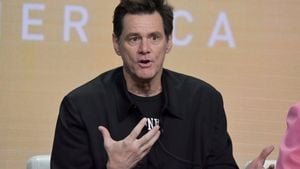The climate crisis has become a focal point of international discussions, especially as Australia faces accusations of "exporting climate destruction" to its Pacific neighbors. At the recent Cop29 climate summit, representatives from Vanuatu and Tuvalu voiced their concerns about Australia’s aggressive plans to expand its gas industry, particularly highlighting the potential impacts of new fossil fuel projects.
During these climate negotiations held in Baku, Azerbaijan, the discussions quickly turned heated as Pacific nations described Australia’s plans as hypocritical. Despite presenting itself as a nation committed to combating climate change, the reality is far different. The expansion of the gas industry, particularly through the North West Shelf project, would reportedly result in greenhouse gas emissions 125 times greater than those produced by the island nations combined annually. This stark comparison was enough to raise alarm bells among many affected nations.
Ralph Regenvanu, who serves as Vanuatu’s special envoy for climate change, openly criticized the Australian government, expressing disbelief over its dual stance. On one hand, Australia seeks to position itself as a leader on the global climate stage, yet on the other, it continues to push forward with fossil fuel developments. "Australia is not acting in good faith," Regenvanu stated. He urged the country to rethink its energy policies, stressing the urgent need to transition away from fossil fuels, especially considering the significant impact rising sea levels and extreme weather pose to his country.
Regenvanu’s sentiments were echoed by Maina Talia, Tuvalu’s climate change minister, who articulated the dire stakes involved for small island states. Talia reminded the summit of the heightened urgency for action, emphasizing how limiting global heating to 1.5 degrees Celsius is not just theoretical; for many Pacific communities, it’s about survival. He stated, “We need to hold industrialized countries accountable for their actions. Our future lies solely in their hands.”
Against this backdrop of criticism, the Australian climate change minister, Chris Bowen, attended the conference, positioned at the forefront of some of the most impactful negotiations. Bowen aimed to discuss the development of new global climate finance goals, advocating for at least $1 trillion annually by 2030 to support developing countries affected by climate change. This stance hopes to counterbalance the criticism and reaffirm Australia’s commitment to climate finance, reassuring international partners of its intentions.
Australia's aggressive gas expansion plans are not just limited to the North West Shelf. The country is also pursuing the Beetaloo Basin, where engineering group Liberty Energy has been working closely with Tamboran Resources Corporation on extensive drilling operations. Coincidentally, these projects are aligned with the nomination of Chris Wright, chief executive of Liberty Energy and Donald Trump’s newly appointed energy secretary, who has intimate ties with these ambitious extraction plans. This connection raises concerns about the future of Australia’s energy policies under Wright's leadership, especially with intentions to extract more fossil fuels.
Unlike the historical narrative framing fossil fuels as the backbone of economic development, increased scrutiny has uncovered the environmental consequences tied to extraction and consumption. This results from decades of fossil fuel projects, which have become more controversial as the world recognizes the urgency of addressing climate issues. Subsequent generations are being left to tackle the fallout from these decisions, which have compounded the degradation of ecosystems and increased vulnerability of communities impacted by climate change.
Australian leaders face heightened scrutiny from their own citizens as well, with growing calls from activist groups and Pacific nations urging the government to halt new fossil fuel projects. Despite the ambitious targets for net-zero emissions by 2050, many critics argue the current agenda indicates otherwise and demands immediate transformation.
While the government prioritizes economic opportunities linked to gas exports, advocates for climate action point out the inherent contradiction. Australia is currently the world’s third-largest fossil fuel producer, and increasing production puts the interests of polluting industries above family livelihoods, natural landscapes, and long-term community welfare.
Simultaneously, climate activists, including prominent figures such as mining magnate Andrew Forrest, have been vocal about the necessity to move beyond fossil fuels. While Forrest’s Fortescue Metals Group has historically relied on mining, he recently expressed support for the Fossil Fuel Non-Proliferation Treaty, advocating for the urgent need to phase out fossil fuel dependence globally. Forrest has been clear about the devastating impacts climate change has wrought – hurricanes and unrelenting flooding – stating, “The world is watching. The only solution is to stop burning fossil fuels.”
Forrest’s transition from supporter of fossil fuel expansion to advocate for clean energy showcases the shifts undertaken by some industry leaders, aligning profit motives with environmental responsibility. Although his company plans to achieve decarbonization by 2030, the question remains whether Australia's broader industry will follow suit or resist the necessary shifts toward sustainability.
With the world watching closely, the dichotomy between Australia’s climate commitments and its fossil fuel policies raises significant concerns. It begs the question: can Australia reconcile its economic aspirations tied to gas exports with ethical responsibilities to its Pacific neighbors and the planet? The conversations from the climate summit may echo this dilemma for years to come, as communities, advocates, and policymakers navigate these complex issues.
Looking forward, Australia’s stance at future climate talks will not only affect its reputation among international partners but will also shape the discourse within the nation about what constitutes true climate justice and environmental responsibility.



